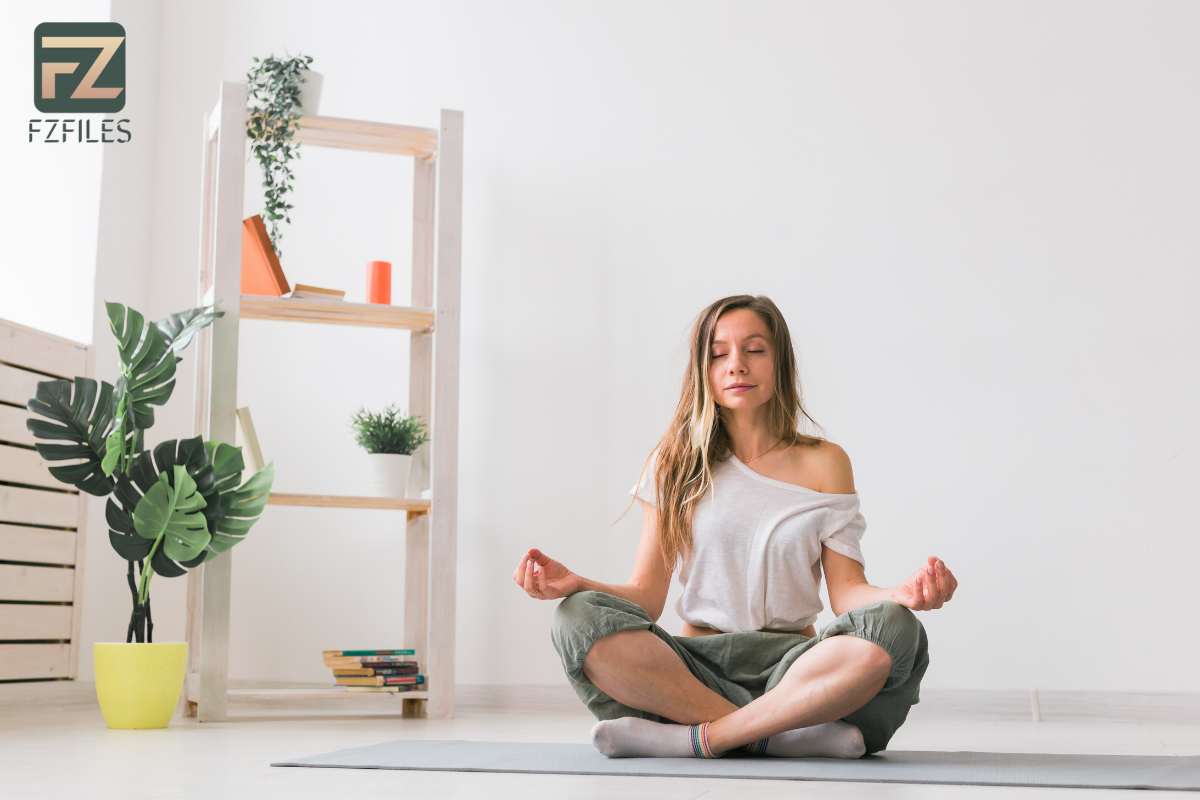Introduction to Yoga and Meditation for Mental Health
In the present high-speed world, emotional wellness has turned into a critical worry for some individuals. The pressures of modern life, work, and personal responsibilities can take a toll on our mental well-being. To combat these challenges, more individuals are turning to holistic practices like yoga and meditation. These ancient disciplines offer a natural and effective way to enhance mental health, reduce stress, and improve overall well-being.
In this comprehensive guide, we’ll delve into the mental health benefits of yoga and meditation, explore how to combine these practices and provide practical tips for creating a personalized routine. Whether you’re new to these practices or looking to deepen your understanding, this guide will help you harness the power of yoga and meditation for mental health in 2024.
Mental Health Benefits of Yoga
Stress Reduction
Yoga is renowned for its stress-relieving properties. Through a combination of physical postures, breathing exercises, and mindfulness, yoga helps to calm the nervous system and reduce the production of stress hormones like cortisol. Regular practice can lead to a significant reduction in stress levels, promoting a sense of peace and relaxation.
Improved Mood
Studies have shown that yoga can enhance mood and emotional well-being. The physical activity involved in yoga releases endorphins, the body’s natural mood lifters. Additionally, the meditative aspects of yoga encourage a positive outlook and help to alleviate symptoms of depression and anxiety.
Enhanced Focus and Concentration
Yoga requires mindful movement and deep concentration, which can improve cognitive function and mental clarity. Practicing yoga regularly can enhance focus, attention, and memory, making it an excellent tool for maintaining mental sharpness.
Better Sleep
Insomnia and poor sleep quality are common issues that can negatively impact mental health. Yoga promotes relaxation and helps to regulate the body’s sleep-wake cycle. Poses such as Savasana (Corpse Pose) and Viparita Karani (Legs-Up-The-Wall Pose) are particularly effective in preparing the body for restful sleep.
Anxiety Relief
Yoga’s emphasis on deep breathing and mindfulness can significantly reduce anxiety. Techniques such as Pranayama (breath control) and meditation help to calm the mind and alleviate anxious thoughts. By focusing on the present moment, yoga helps to break the cycle of worry and fear.
Mental Health Benefits of Meditation
Mindfulness and Present Moment Awareness
Meditation is a practice that cultivates mindfulness, the art of being fully present in the moment. This awareness can reduce the impact of negative thoughts and emotions, helping individuals to manage stress and anxiety more effectively. Mindfulness meditation encourages acceptance and non-judgment, fostering a more balanced and compassionate outlook on life.
Emotional Regulation
Regular meditation practice can improve emotional regulation and resilience. By observing thoughts and emotions without attachment, meditation helps individuals to respond to situations more calmly and thoughtfully. This emotional stability is crucial for maintaining mental health and well-being.
Decreased Symptoms of Depression
Research has demonstrated the way that reflection can lessen the side effects of gloom. Mindfulness-Based Cognitive Therapy (MBCT), which combines meditation with cognitive behavioral techniques, has been particularly effective in preventing relapse in individuals with recurrent depression. Meditation encourages positive thinking patterns and helps to break the cycle of negative rumination.

Enhanced Self-Awareness
Meditation fosters greater self-awareness and insight. By turning inward and observing the mind, individuals can gain a deeper understanding of their thoughts, behaviors, and triggers. This self-awareness is a powerful tool for personal growth and mental health management.
Increased Compassion and Empathy
Meditation practices such as Loving-Kindness Meditation (Metta) cultivate feelings of compassion and empathy towards oneself and others. This practice can improve social connections and foster a sense of community, which is essential for mental health.
Combining Yoga and Meditation
Synergistic Effects
Yoga and meditation complement each other beautifully, offering synergistic benefits for mental health. Yoga prepares the body and mind for meditation by releasing physical tension and promoting relaxation. Meditation, in turn, deepens the mindfulness cultivated during yoga practice, enhancing overall mental well-being.
Holistic Approach
Combining yoga and meditation provides a holistic approach to mental health. While yoga addresses the physical and mental aspects of well-being, meditation focuses on the mind and emotional regulation. Together, they create a balanced practice that supports comprehensive mental health.
Practical Tips
- Start with Yoga: Begin your practice with a gentle yoga session to warm up the body and calm the mind. Focus on poses that promote relaxation and mindfulness.
- Incorporate Meditation: Follow your yoga practice with a meditation session. Pick a contemplation procedure that impacts you, like care, cherishing generosity, or breath mindfulness.
- Consistency is Key: Intend to rehearse routinely, regardless of whether it’s only a couple of moments every day. Consistency is essential for reaping the mental health benefits of yoga and meditation.
- Listen to Your Body: Pay attention to how your body and mind feel during practice. Adjust your routine as needed to ensure it meets your mental health needs.
Creating a Yoga and Meditation Routine
Assess Your Needs
Identify your specific mental health goals. Whether you want to reduce stress, improve mood, or enhance focus, understanding your needs will help you tailor your practice accordingly.
Choose the Right Poses and Techniques
Select yoga poses and meditation techniques that align with your goals. For example, if you’re seeking stress relief, focus on restorative poses and mindfulness meditation. If you want to boost energy, choose invigorating poses and breathwork.
Set a Schedule
Lay out a normal practice plan that squeezes into your day-to-day daily schedule. Consistency is essential for accomplishing enduring psychological wellness benefits. Indeed, even a short everyday practice can have a tremendous effect.
Create a Comfortable Space
Designate a quiet, comfortable space for your yoga and meditation practice. Ensure it’s free from distractions and conducive to relaxation and focus.
Seek Guidance
Think about taking classes or looking for direction from experienced educators. They can provide valuable insights and ensure you’re practicing safely and effectively.
Sample Yoga and Meditation Routine
Morning Routine (30 minutes)
Yoga (15 minutes):
- Sun Salutations (Surya Namaskar) – 5 minutes
- Child’s Pose (Balasana) – 2 minutes
- Cat-Cow Pose (Marjaryasana-Bitilasana) – 3 minutes
- Downward Dog (Adho Mukha Svanasana) – 3 minutes
- Savasana (Corpse Pose) – 2 minutes
Meditation (15 minutes):
- Mindfulness Meditation – 10 minutes
- Loving-Kindness Meditation – 5 minutes
Evening Routine (30 minutes)
Yoga (15 minutes):
- Seated Forward Bend (Paschimottanasana) – 3 minutes
- Pigeon Pose (Eka Pada Rajakapotasana) – 3 minutes on each side
- Legs-Up-The-Wall Pose (Viparita Karani) – 5 minutes
Meditation (15 minutes):
- Breath Awareness Meditation – 10 minutes
- Body Scan Meditation – 5 minutes
Expert Tips for Mental Well-being
Stay Consistent
Consistency is the key to experiencing the mental health benefits of yoga and meditation. Aim to practice regularly, even for a few minutes each day. Over time, these small efforts will accumulate and lead to significant improvements in your mental well-being.
Practice Mindfulness Throughout the Day
Mindfulness isn’t limited to formal meditation sessions. Incorporate mindfulness into your daily activities by paying attention to the present moment and being aware of your thoughts and feelings. This practice can help reduce stress and enhance your overall mental health.
Be Kind to Yourself
Self-compassion is a crucial aspect of mental well-being. Indulge yourself with benevolence and understanding, particularly during testing times. Recognize your endeavors and praise your advancement, regardless of how little.
Connect with Others
Social connections are vital for mental health. Make time to associate with companions, family, or care groups. Sharing your experiences and feelings with others can provide emotional support and foster a sense of community.
Seek Professional Help if Needed
While yoga and meditation can significantly improve mental health, they are not a substitute for professional treatment. If you’re experiencing severe mental health issues, seek help from a mental health professional. They can provide the necessary support and guidance for your well-being.
Conclusion and Additional Resources
Yoga and meditation offer powerful tools for enhancing mental health and well-being. By incorporating these practices into your daily routine, you can experience reduced stress, improved mood, better focus, and overall mental clarity. Remember to stay consistent, listen to your body, and seek guidance when needed.

[…] has surged in popularity over the past few years, becoming a favorite among fitness enthusiasts and yoga practitioners alike. This dynamic practice involves performing yoga poses in a heated room, […]
[…] Building a successful running habit requires more than just lacing up your shoes and hitting the pavement. It involves strategic planning, consistency, and a positive mindset. Here are nine comprehensive tips to help you establish and maintain a running routine that you can stick with and enjoy. […]